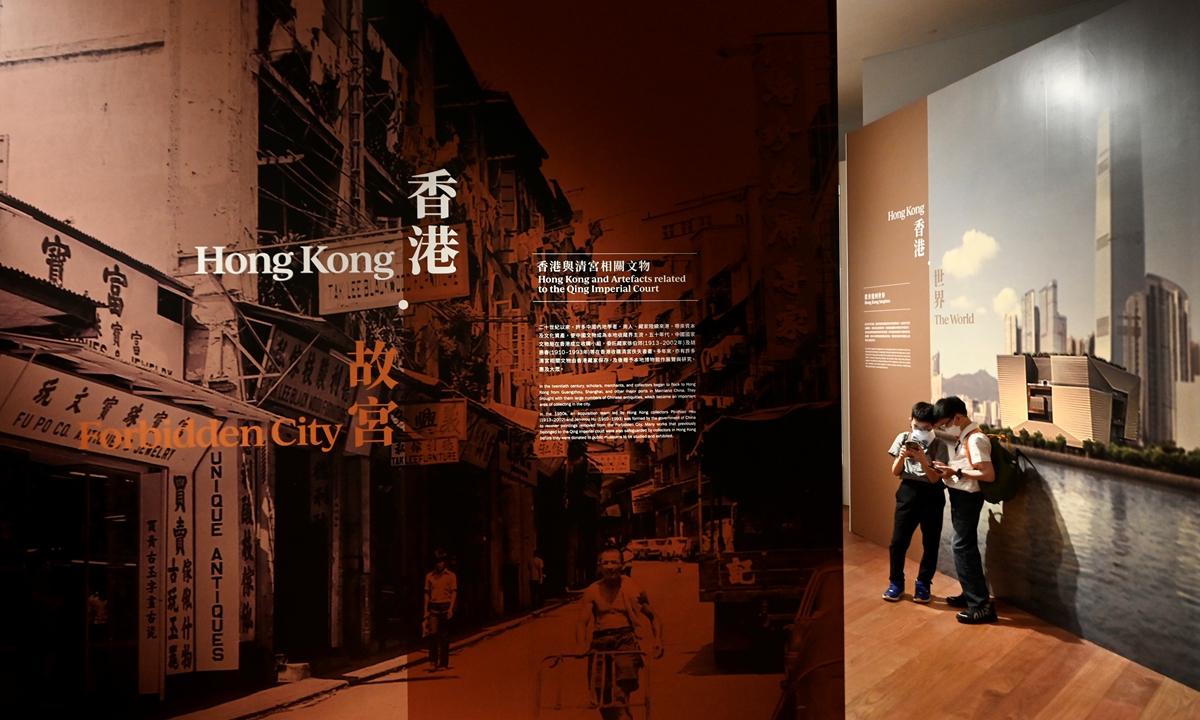
Tourists at the newly opened Hong Kong Palace Museum. Photo: IC
Since its grand opening on July 3, the Hong Kong Palace Museum has become one of the most popular destinations for local residents, receiving over 60,000 visitors as of Tuesday. The Museum announced that it has cooperated with the local education bureau and will issue a booklet on cultural relics and Chinese history, to be introduced to all Hong Kong secondary schools in the new semester.
Titled A Closer Look at Heritage - A Resource Book for Teaching Chinese History, the booklet uses the exhibits of the Hong Kong Palace Museum as the main body of knowledge, complemented by flexible teaching and visiting activities, which are designed to encourage teachers to use cultural relics to promote history learning among young Hong Kong people. In this way, students can better appreciate the richness of Chinese culture and the splendor of Chinese civilization, and embrace national sentiment toward the country, spokesperson of the Hong Kong Special Administrative Region's Education Bureau told the Global Times on Tuesday.
Louis Ng, curator of the Hong Kong Palace Museum, said that heritage education is the "top priority" of the museum's work. As a novel way to cultivate students' interest in Chinese culture, art and history, the museum will continue to push forward its collaboration with the local education sector, and hopefully expand this collaboration to elementary schools and kindergartens as well, the Xinhua News Agency reported on Tuesday.
"In the past, secondary school classes focused mainly on the general knowledge of Chinese history, such as the rise and fall of dynasties, which was mostly rational. Now, with the introduction of appreciating cultural relics through direct interaction, it develops students' aesthetic ability. This novel way of learning is unique, in that it connects young people with the country's past in the most specific and concrete manner," Lawrence Tang Fei, a member of the Chinese Association of Hong Kong and Macao Studies, told the Global Times on Tuesday.
Such a connection makes it easier for students to understand and recognize Chinese culture, and further boosts a sense of belonging and national identity, Tang said.
What's more, the collaboration of the Hong Kong Palace Museum and the education authority has ensured that the content of the textbook is professional and authoritative, while suited to the learning ability of secondary school students, experts said.
The Hong Kong Palace Museum displays 914 artworks and relics on loan from the Beijing Palace Museum, among which 166 are first-class cultural relics recognized as national treasures. This is the largest loan by the Palace Museum to another institution since its establishment in 1925.
Since its opening on July 3, the museum has become one of the most popular destinations for local residents, receiving over 60,000 visitors as of Tuesday, hkcna reported. More than 90 percent of the tickets for August have been sold, and the response from the audience has been overwhelming, the report said.
The first week of the museum's opening saw some 35,000 visitors, China News reported on July 11.
Local media reports said on Monday that only two weeks into its opening, ticket scalping has been found in a number of locations over the internet, reselling the ticket at a price of up to HK$75 ($9.6) each. Amid the heated fight for the museum's entrance, authorities reminded the public to remain rational and buy tickets from legitimate agencies.
Wayne, an employee in the financial sector in Hong Kong who recently visited the museum, told the Global Times on Tuesday that tickets for weekends are usually sold out, and normally it takes about 10 minutes on weekdays to enter the exhibition hall.
Another local resident using a web name of Nan told the Global Times that she had a delightful experience visiting the museum, where there were interpreters and multimedia products to explain in detail each of the artifacts.
Conveying wrong and poisonous thinking by some teachers in Hong Kong has long been a hard bone to crack. In June, the local education bureau
announced the first batch of textbooks applicable to the subject of Citizenship and Social Development in Hong Kong, which corrected the much-criticized course known as Liberal Studies, where much of its content was found to have incited hatred among young people and vilified the government.
In the new Citizenship and Social Development textbooks in Hong Kong, the truth of "Hong Kong has never been a colony of Britain" was introduced, correcting some long-held flawed thinking in the city's education system, former Hong Kong Legislative Council president and veteran councilor for the education sector Rita Fan Hsu Lai-tai told the Global Times
in an exclusive interview in June.




